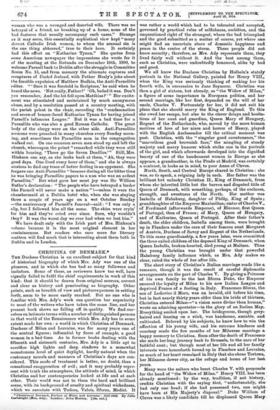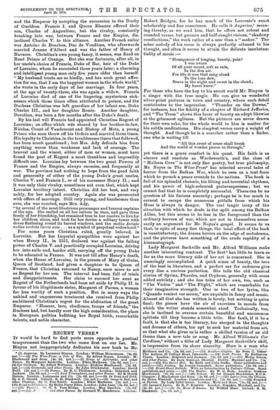CHRISTINA OF DENMARK.*
Tas Duchess Christina is an excellent subject for that kind of historical biography of which Mrs. Ady was one of the pioneers, and in which she has had so many followers and imitators. Some of these, as reviewers know too well, have signally failed to fulfil the chief requirements in work of this kind: that it should be drawn from original sources, correct and clear as history and penetrating as biography. Other points, such as breadth of view and picturesqueness in setting forth, seem to be more easily reached. But no one who is familiar with Mrs. Ady's work can question her superiority to most of the writers who have taken the same line, and her present book shows no falling off in quality. We find our- selves on intimate terms with a number of distinguished persons in that world of the Renaissance which Mrs. Ady has to some extent made her own : a world in which Christina of Denmark, Duchess of Milan and Lorraine, was for many years one of the central figures; influential by force of example, a good woman in a bad time. As in former books dealing with the fifteenth and sixteenth centuries, Mrs. Ady is a little apt to sacrifice high lights and deep shadows to a somewhat monotonous level of quiet daylight, hardly natural when the customary morals and manners of Christina's days are con- sidered. This mode of treatment is better, no doubt, than a sensational exaggeration of evil ; and it may probably repre- sent with truth the atmosphere, the attitude of mind, in which Christina and her contempowies looked at life and at each other. Their world was not to them the hard and brilliant scene, with its background of cruelty and spiritual wickedness, which we associate with Tudors, Valois, Roma, Medici. It • Christina of Denmark, Duck.. of Milan and Lorraine: 1622-1500. By Jtdin
Cartwright Mrs. Ady). London John linenty. [18a. not.] .
was rather a world which had to be tolerated and accepted, governed by practical rules of selfishness, ambition, and the unquestioned right of the strongest, where the bad triumphed and the good submitted as a matter of course, yet where one might find an uncertain share of domestic happiness and peace in the centre of the storm. These people did not know security ; therefore, as Mrs. Ady represents them, they lived fairly well without it. And the best among them, such as Christina, were undoubtedly honoured, alike by bad and good.
We all know the Duchess Christina by Holbein's stately portrait in the National Gallery, painted for Henry VIII, when the King was seriously thinking of making her his fourth wife, in succession to Jane Seymour. Christina was then a girl of sixteen, but already, as "the Widow of Milan," a figure of some importance in European politics, and her second marriage, like her first, depended on the will of her uncle, Charles V. Fortunately for her, it did not suit his plans that she should marry the King of England. To this she owed her escape, but also to the clever delays and hesita- tions of her aunt and guardian, Queen Mary of Hungary, Regent of the Netherlands, who, moved by the more human motives of love of her niece and horror of Henry, played with the English Ambassador till the critical moment was past. Christina, with the " singular good countenance," the "marvellous good brownish face," the mingling of steady majesty and merry humour which strike one in the portrait of the girl, and which afterwards developed into the dignified beauty of one of the handsomest women in Europe as she appears, a grandmother, in the Prado at Madrid, was certainly a contrast, in looks as in mind, to poor Anne of Cleves.
North, South, and Central Europe shared in Christina : she was, so to speak, a reigning lady in each. Her father was the brilliant but unlucky Christian II., King of Denmark, from whom she inherited little but the barren and disputed title of Queen of Denmark, with something, perhaps, of the coolness, strength, and sweetness of the North. Her mother was Isabella of Habsburg, daughter of Philip, King of Spain ; granddaughter of the Emperor Maximilian; sister of Charles V., of Ferdinand (afterwards Emperor), of Eleanor, first Queen of Portugal, then of France; of Mary, Queen of Hungary, and of Katherine, Queen of Portugal. After their father's death, the elder children, Isabella among them, were brought up in Flanders under the care of their famous aunt Margaret of Austria., Duchess of Savoy and Regent of the Netherlands. To this seine guardianship, a few years later, were committed the three exiled children of the deposed King of Denmark, when Queen Isabella, broken-hearted, died young at Malines. Thus the young Christina was brought under that powerful Habsburg family influence which, as Mrs. Ady makes so clear, ruled the whole of her after life.
The short story of Christina's Italian marriage reads like a romance, though it was the result of careful diplomatic, arrangements on the part of Charles V. By giving a Princess of his own family to the last Stoma Duke, the Emperor ensured the loyalty of Milan to his new Italian League and deprived France of a footing in Italy. Francesco Sforza, the son of Lodovico it Moro, was an invalid, old before his time, but in fact nearly thirty years older than his bride of thirteen. Christina entered Milan—" a vision more divine than human," wrote an admiring spectator—in the glory of an Italian May. Everything smiled upon her. The bridegroom, though grey- haired and leaning on a stick, was handsome, amiable, and cultivated. Beloved by his subjects, he knew how to win the affection of his young wife, and his extreme kindness and courtesy made the few months of her Milanese marriage a happy memory to Christina. Soon after the death of Francesco she made her long journey back to Brussels, to the care of her faithful aunt ; but though most of her life and all her family interests were henceforth bound up in Flanders and Lorraine, so much of her heart remained in Italy that she chose Tortona, her Milanese dower city, as the refuge and home of her last years.
Many were the suitors who beset Charles V. with proposals for the hand of "the Widow of Milan." Henry VIII. has been already mentioned : by the way, tradition, if not history, credits Christina with the saying that, "unfortunately, she bad only one head; if she had possessed two, one might have been at His Majesty's disposal." Duke William of Cleves was a likely candidate till he displeased Queen Mary and the Emperor by accepting the succession to the Duchy of Gueldres. Francis L and Queen Eleanor offered their son, Charles of Angouldme, but the rivalry, constantly breaking into war, between France and the Empire, dis- inclined Charles V. to this alliance. Another French suitor was Antoine de Bourbon, Dac de Vendome, who afterwards married Jeanne d'Albret and was the father of Henry of Navarre. Christina's own young fancy, it seems, was fixed on Rend Prince of Orange. But she was fortunate, after all, in her uncle's choice of Francis, Duke of Bar, heir of the Duke of Lorraine, whom he succeeded three years later; a charming and intelligent young man only five years older than herself. "My husband treats me so kindly, and has such great affec- tion for me, that I am the happiest woman in the whole world," she wrote in the early days of her marriage. In four years, at the age of twenty-three, she was again a widow. Francis of Lorraine died of one of the lingering, mysterious sick- nesses which those times often attributed to poison, and the Duchess Christina was left guardian of her infant son, Duke Charles III., and her daughter Renee. Another daughter, Dorothea, was born a few months after the Duke's death.
By his last will Francis had appointed Christina Regent of Lorraine; an office which wtts shared by her brother-in-law, Nicolas, Count of Vaudemont and Bishop of Metz, a young Prince who soon threw off his Orders and married three times. His loyalty to Christina, in the troublesome times that followed, has been much questioned ; but Mrs. Ady defends him from anything worse than weakness and lack of courage. The bravest and the wisest, either of men or women, must have found the poet of Regent a most thankless and impossibly difficult one. Lorraine lay between the two great Powers of France and the Empire, always enemies, and frequently at war. The province had nothing to hope from the good faith and generosity of either of the young Duke's great uncles, Charles V. and Francis L, or of his successor Henry II. ; and it was only their rivalry, sometimes not even that, which kept Lorraine territory intact. Christina did her best, and very nobly, for her adopted country. Again she was persecuted with offers of marriage. Still very young, and handsomer than ever, she was courted, says Mrs. Ady, "by several of the most illustrious personages and bravest captains of the age. She smiled on all her suitors in turn, and gave them freely of her friendship, but remained true to her resolve to live for her children alone, and took for her device a solitary tower with doves fluttering round its barred windows, and the motto Accipio Indies sordida turns eves . . . as a symbol of perpetual widowhood."
For some years Christina ruled, greatly beloved, in Lorraine. But her Imperial sympathies were against her when Henry IL, in 1551, declared war against the failing power of Charles V. and practically occupied Lorraine, driving her into exile and, harder still, carrying off the young Duke to be educated in France. It was not till after Henry's death, when the House of Lorraine, in the person of Mary of Guise, Queen of Scotland, had given a daughter to be Queen of France, that Christina returned to Nancy, once more to act as Regent for her son. The interval had been full of trials and disappointments. Her claim to succeed her aunt as Regent of the Netherlands had been set aside by Philip IL in favour of his illegitimate sister, Margaret of Parma, a woman far less worthy of such a position. But in many ways the unkind and ungenerous treatment she received from Philip embittered Christina's regret for the abdication of the great Emperor. "Honour, love, obedience, troops of friends," the Duchess had, but hardly ever the high consideration, the place in European politics befitting her Royal birth, remarkable talents, and noble character.



























































 Previous page
Previous page